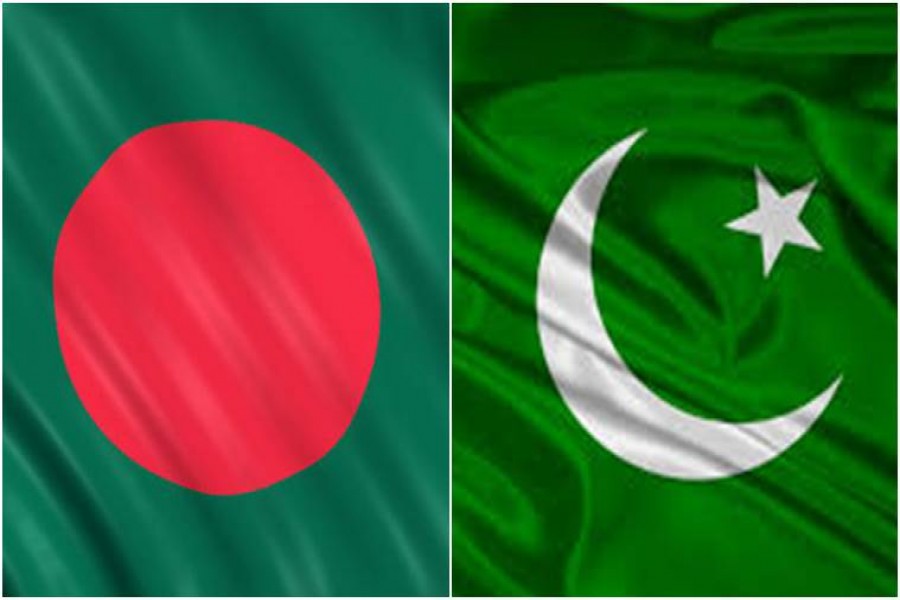
Published :
Updated :

That Bangladesh has long been performing better than Pakistan is acknowledged by reputed think tanks, economic analysts and different other organisations the world over. The latest such appreciation for the former comes from the Toronto-based International Forum for Rights and Security (IFFRS). The Canadian think tank has succinctly put the contrary cases of national progress in an article, "Bangladesh and Pakistan---Formerly One Nation, Today a World Apart" published on July 30. The article has given a brief analysis of how Bangladesh has become a 'miracle story and Pakistan 'a disaster tale'.
Nothing could be more savouring for a country on its 50th anniversary of independence and the birth centenary of the man who politically espoused the Bangalee cause as no one else did, which ultimately made possible the birth of a sovereign nation. Indeed, the father of the nation was vocal right from the beginning about the exploitation of then East Pakistan by West Pakistan. He was fully aware of the Bangalee nation's potential when many at home and abroad warned of the idea of the Bangalees becoming a self-governing nation as a non-starter. Look how Sheikh Mujib and his political foresight have been vindicated now!
Not only has Bangladesh outpaced Pakistan by miles, on many counts it has overtaken its bigger and earlier far advanced neighbours. The global think tank has concentrated only on the two countries because 50 years ago they were one country and then the unequal war imposed on the emerging Bangalee nation left it ruinous economically and in terms of infrastructure. From then on, the two nations charted different courses.
Most importantly, the IFFRS observes, the two countries are a world apart because their perceptions of national interests are different. While Bangladesh sets its eyes on human development and economic growth for a brighter future, for Pakistan human development comes as a distant second. Bangladesh aims at 'increasing exports, reducing unemployment, improving health, reducing dependence upon loans and aid, and further extending microcredit', the IFFRS elaborates. On the contrary, Pakistan's primary concern is to check-mate India and nurture extra-state actors.
No wonder, therefore, that 50 years ago Pakistan was 70 per cent richer than Bangladesh and today their status has reversed with Bangladesh becoming 45 per cent richer than Pakistan. The nation of which the viability was questioned by crooked men like Henry Kissinger who called Bangladesh a 'basket case' could not give a more fitting response. Today Bangladesh's per capita income is $2,227 whereas it is $1,543 for Pakistan ---way behind. In the year 2021 alone when most economies have contracted due to the impact of Covid-19, Bangladesh saw a 9.0 per cent rise in its per capita GDP. Over the past 20 years Bangladesh's per capita GDP increased by 500 per cent, two and a half times that of Pakistan, the think tank reckons. During these two decades the former has overtaken the latter on key economic indicators.
Then the IFFRS has cited an example of economic and entrepreneurial management versus mismanagement between Bangladesh and Pakistan respectively. With no cultivation of cotton, Bangladesh has thousands of garments factories which import cotton worth a couple of hundred millions and exports it in the form of readymade garments valued at $35 billion. The value addition in the process largely contributes to its foreign exchange earning. On the other hand, Pakistan's export of garments and textile products has failed to cross the threshold of $10 billion. But Pakistan is a cotton-growing country. Worse still is the fact that now it has to import cotton. Mismanagement of agricultural products at its worst, it seems.
Yet Bangladesh's miracle story remains incomplete, if its economic indicators alone are taken into account. In several human indices, Bangladesh has performed better than not only Pakistan but also India. On the economic front, Bangladesh could do for the first time in its history lend $200 million from its forex reserve to help Sri Lanka tide over its depleting foreign exchange reserve. Mind it, this is done at a time when the world is reeling from economic recessionary impact!
All this should make this nation proud. But there are grey areas where focus should be directed before it is too late. If Pakistan's feudal and tribal structure proves to be a stumbling-block on its economic take-off, Bangladesh also has reasons to be concerned about its economic disparities. If the per capita GDP has grown by 9.0 per cent, who have garnered the major share? Certainly not the middle class, lower middle class, the poor and the marginalised people. People belonging to these groups and classes have lost jobs, trade and become poorer and even paupers.
In line with the global trend, the rich and the super rich have accumulated more wealth during the pandemic. This accumulation of wealth in a few hands is no sign of robust economic health; rather it is an alarming development for a country where the pledge of the founding fathers of this nation was to ensure economic justice for each and every citizen through equitably sharing of wealth. That the nation has beaten Pakistan comprehensively should not make the nation complacent. It must put its own house in order to avoid the ill consequences of wider economic disparities. Had corruption and money laundering been done away with, this nation would give even a better account of itself.


 For all latest news, follow The Financial Express Google News channel.
For all latest news, follow The Financial Express Google News channel.